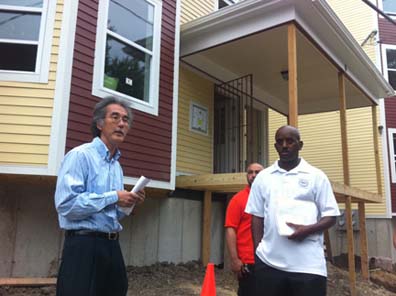July 26, 2012
 Woodcliff Street Homes: Michael Kozu, left, speaks as homebuilder Vargas DaSilveira and city ISD asst. commissioner Darryl Smith listen outside 6 Woodcliff Street.
Woodcliff Street Homes: Michael Kozu, left, speaks as homebuilder Vargas DaSilveira and city ISD asst. commissioner Darryl Smith listen outside 6 Woodcliff Street.
It was pretty much the last thing that the senior citizens living at the well-manicured Cardinal Medeiros Manor needed to see when they gazed out their windows: Prostitutes leading johns into a makeshift brothel/shooting gallery on a trash strewn empty lot across the street.
That was Woodcliff Street a year ago.
Today, city officials proudly showcased the new and improved Woodcliff, complete with a trio of huge three-decker homes that have sprouted on the troubled lots. All three of the homes — which will be finished in September — have already been sold to first-time homebuyers for between $490,000-$485,000, a strong signal of consumer confidence in this once-depressed slice of the neighborhood.
The Dorchester-based homebuilder, Vargas DaSilveira, purchased the empty lots at 6,10 and 12 Woodcliff two years ago from an attorney. DaSilveria says he has no idea what was on the land in past years, but the evidence of many years of illicit behavior was hard to miss during the clean up.
Michael Kozu, an organizer with the Grove Hall-based Project RIGHT, said that Woodcliff had become a notorious magnet for problems. Residents complained to the police and his agency about the problem. When the mayor’s office formed a multi-agency task force to focus on the Blue Hill corridor between Franklin Park and Dudley Street last year, the Woodcliff lots became one of their first targets.
The task force— known as the Blue Hill Ave. Neighborhood Response Team (NRT)— asked the new property owner, DaSilveira, to speed up his plans for development.
“It was quite blatant what was going on here,” explained Kozu. “The NRT asked Vargas to come down and secure the property. He put up a fence and made it inaccessible and also cleared all the debris and growth.”
Darryl Smith, an assistant commissioner at the city’s Inspectional Services Department, heads up the NRT for Mayor Menino. Smith heard from residents that prostitutes were posting on the corner of Blue Hill and Woodcliff and using a city-owned bench as a marker. Smith had the bench pulled out of service. The NRT then helped DaSilveira solicit input from neighborhood residents about what they wanted to see him build on the street. The new homes— approved earlier this year by the Boston Redevelopment Authority—are the result.
Smith says that Woodcliff Street is one of 150 properties that the NRT has focused on over its first year. The task force has issued more than 50 violations orders— through ISD— to homes and businesses that were deemed “problems” by residents and then inspected by the city.
In another success story, Smith pointed to a home on Mt. Pleasant Street that was also being used as a flophouse for prostitution. It has since been shut down. The owner of a Blue Hill liquor store— that neighbors saw as a source of trouble— has agreed to curtail the sale of “nips” in an attempt to discourage loitering and litter around the store. Other initiatives have included clearing overgrown vacant lots, shutting down an illegal restaurant in an apartment building and targeting an auto business that was allegedly hosting after hours parties.
“We’ve had a block by block approach in this first year,” says Kozu, whose Project RIGHT is one of the main partners in the NRT task force. “We conduct biweekly walk-throughs to find out what the problems are. We find that we often don’t get a third of the way through them before we’re stopped by residents with new complaints.”
“We know we have a lot to do. But there’s been a significant number of issues resolved already,” said Kozu.
"What we know is that enforcement alone is not going to solve a problem," says Smith, who said that the NRT has engaged social service agencies to try to funnel prostitutes and homeless in the area to appropriate recovery facilities.
Villages:
Topics:



